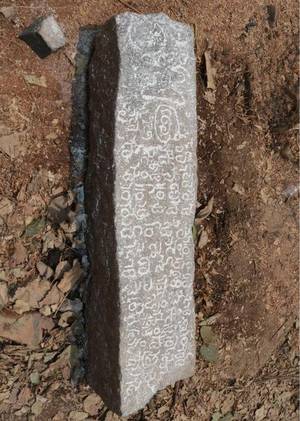13th century inscription deciphered in Sayampeta Haveli
A Telugu calender year by name Nandidhata Samvatsara, which was celebrated by Telugu speaking people during the Kakatiya dynasty Rudra Deva’s reign (AD 1158 – 1195) was recently discovered by Archaeological Survey of India.
Archaeologists managed to decipher an inscription found on a slab fixed to a wall in a temple at Sayampeta Haveli in Geesukonda mandal of Warangal district.
D. Kanna Babu, superintending archaeologist, Archaeological Survey of India, Chennai, said in inscription, quite surprisingly, they found the name of an ancient Telugu cyclic year Nandidhata Samvatsara. He said people are unaware of this year, either in the traditional list of 60 Telugu calendar years or in lithic records of historical times. “Somehow, the name is missing from the list of traditional years of Telugu calender. We are examining if it matches with another name in the present calender with the help of astronomical texts,” he said.
As part of the Temple Survey Project, the ASI officials visited the ancient Panchalaraya Swamy temple, which was constructed in the Kakatiya era and discovered the damaged inscription on the rear wall of sanctum sanctorum, he said. Elucidating further details, Mr. Babu said that the inscription spanned six lines and was probably written in 13th century Telugu script.
Badly damaged
“For the past few decades, the the temple is annually treated with thick coating of lime wash in an effort to beautify it. We stumbled upon this piece without knowing its historical importance and ultimately, caused damage to the epigraph,” he said.
Mr. Babu said the epigraph states that Rudra Deva provided a perpetual lamp, along with other gifts, to the presiding deity in this temple on Mangalavara (Tuesday), the twelfth day of Bhadrapada masa during the year Saka 1116, equivalent to Nandidhata Samvatsara, (corresponding to AD 1194) in memory of his father Prolaraju.
The archaeologist added that another inscription was discovered at Trikuta temple in Jangaon recently, which also pertained to Rudra Deva.
A total of 19 epigraphs of Rudra Deva have been discovered so far.
source: http://www.thehindu.com / The Hindu / Home> News> Cities> Hyderabad / by Abhinay Deshpande / Hyderabad – April 19th, 2018
